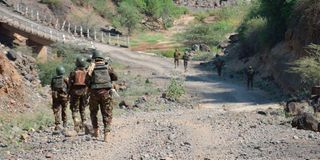
Chepkesin Primary School in Baringo North after renovation by the Kenyan Defence Forces in the ongoing Operation Maliza Uhalifu North Rift on December 7, 2023.
| Mary Wambui | Nation Media GroupNews
Premium
KDF: Why it will take at least 20 years to eradicate banditry
What you need to know:
- Strategy for six counties in North Rift is to build and rehabilitate schools into model peace boarding facilities that admit pupils from warring communities to foster co-existence.
- “We have experienced a decline in attacks and killings since Operation Maliza Uhalifu began.” – Chief Mercy Amit, Kapedo Location.
It is estimated that banditry in the North Rift will take 20 to 30 years to fully end, once a new generation of educated community members breaks free from the cultural and tradition straitjacket that fuels the vice.
Brigadier Ahmed Saman, the commander of the Kenya Defence Forces (KDF) involved in the operation, says that in order to achieve this long-term goal, Operation Maliza Uhalifu has embarked on illiteracy eradication alongside the ongoing security operation to flush out bandits from their hiding places.
“Educating a child today will take almost 20 years, which is why I am saying we need to be patient and that the KDF will need to be present on the ground so that, together, we eradicate this menace,” he explained.
The strategy is part of the entire security Marshall Plan for the six counties in the North Rift that will see schools built as others are rehabilitated and expanded into model peace boarding schools that admit pupils from warring communities to foster co-existence.
Already, four schools Kapedo Mixed Secondary, Mukutani Primary, Chemoril Primary, and Baragoi Integrated Primary Schools have been picked for the project, an initiative that in the long run seeks to bring communities in the conflict belt together so that in the future the children see and appreciate their different cultures and live in harmony.
“This will help us achieve one of our operational objectives, which is to ensure peaceful coexistence among communities. For instance, in Tiaty sub-county, illiteracy levels are almost at 98 percent, which is why construction of schools as well renovation of others, is a vital tool towards elimination of banditry. This is because we have realised that illiteracy has a mutual connection with banditry,” Brig Saman explained adding that attempting to convince an illiterate person to drop harmful customary practices is harder than convincing a literate one hence the need for such formal education.
The schools’ project has kicked off in Baringo and Turkana counties where the KDF has initiated the construction and rehabilitation of an initial 20 schools at a cost of Ksh100 million. The schools are in various stages of completion ahead of their reopening in January.

Kenya Defence Forces soldiers on patrol near Kapedo bridge, one of the most volatile areas in the region, on December 9, 2023.
Major Joseph Wire who is in charge of the projects said the first phase that is currently ongoing involves making sure that pupils have a class to study in and that critical infrastructure like toilets, bathrooms, and water are in place before children resume learning in January.
“In the second phase, the schools will be fenced, dormitories constructed and equipped with furniture and beddings followed by construction of teachers’ quarters in the third and final phase. The setting up of nomadic peace boarding schools will then follow,” he said after inspecting new ablution blocks at Kapedo Mixed Secondary School.
Teachers, school managers, and elders at Chepkesing and Kositei primary in Baringo County and those in Kapedo primary in Turkana County have embraced the strategy but called for the establishment of chief camps or police/military camps nearby to avoid future learning disruptions by bandits.
Kapedo Primary and Secondary schools for example are located along the volatile border of Baringo and Turkana counties and Samburu to the North where attacks are frequent as bandits waylay locals as they fetch water in the nearby Suguta River.
Like other students and teachers Lilian Wangare the Deputy Principal at Kapedo Mixed Secondary, which has been earmarked for expansion into a peace boarding school depends on armed escorts to get to school.
There is no other means of transport considering the volatile nature of the area that even forced the closure of Kapedo Police Station.
Today, the KDF has set up camp in the area to repulse attacks and ensure learning continues at the school that hosts 150 students from one community and eight teachers from different communities.
Ms Wangare has welcomed plans to have children from neighbouring Baringo County admitted foster peaceful coexistence between communities.
“This area has been akin to a mini-Afghanistan… where bandits strike ruthlessly, but we have had a lull in the past two weeks,” she says.
Though the school is an island surrounded by a highly volatile area, it has not suffered any major casualty from bandits’ attacks.
“The last incident was a few years ago when a bullet fired from outside the school hit and killed a student. Since then, we received assistance and a perimeter wall was erected around the school. We have also had the school manned by armed National Police Reservists for the past five years, which has ensured the protection of our students,” says Mercy Asmit, the chief in charge of Kapedo location.
Chief Asmit considers her deployment to the volatile Kapedo a calling and higher mission.
“There was a time locals could not leave their houses to fetch firewood or water without getting killed. We have, however, experienced a decline in attacks and killings since the current Operation Maliza Uhalifu began. We now have the Rapid Deployment Unit, General Service Unit, and KDF, giving us confidence to carry on with daily activities,” Chief Asmit added.
However, safety is still not guaranteed on the road connecting Kapedo and Lokori as bandits target vehicles. The government has, however, plans to build a road connecting the volatile Chemolingot-Kapedo-Lokori road to counter and eliminate bandits.
Established in 1969, Chepkesin Primary School in Baringo North would in the past attract pupils from as far as Uasin Gishu County but as bandit attacks escalated around 2012, the school got attacked and vandalised forcing students to flee.
“The situation worsened in 2017 when attacks on neighbouring villages forced us to close shop and transfer pupils to neighbouring school facilities. In 2018, the situation improved and we got back with a few pupils but then the performance dipped. In 2021, the attacks recurred and we again shifted pupils. This year, the government ordered us to reopen and accorded us police reservists to guard the school,” Samuel Kipkenei, the head teacher explained.

Kenya Defence Forces soldiers patrol Tabda in the central sector of Somalia during 'Operation Linda Nchi' on February 20, 2012.
Fortified by constant police and KDF patrols, the school has retained pupils in class this year and grown its lean population from 45 to 129. The top student in the KCPE exam scored 325 marks.
“We hope that as the new school calendar begins in January, many parents will see it fit to return their children here and that security agencies will maintain their patrols. We also call upon the government to ensure there is food for the pupils so that they only need to worry about their studies,” he added.
Both Chepkesin primary in Baringo North and Kositei primary in Tiaty West are located along bandits’ transit corridors where Baringo borders other counties. Teachers expressed optimism that the planned development of schools and other infrastructure will keep bandits at bay and end the vice.
“Bandits fear development as in their estimation, translates to having government close by. That is why they retreated to hideouts after the KDF opened up roads because they fear serikali itapita hapo (they will encounter security personnel),” said Simon Wawa Arekai, a teacher at Kositei primary.
Brig Saman added that with time, apart from schools, the shared security strategy will include opening up of roads, markets, chiefs’ camps, abattoirs, water pans, and hospitals to bring services closer to the people.
“We are doing this in tandem with the search for bandits. The closer we interact with communities, the more we realise that bandits are in constant flight,” he said.





